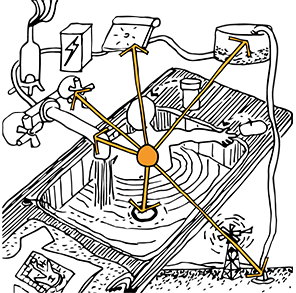NT housing, chook-sheds and rent money
THANKS TO THE AUSTRALIAN FOR THE FOLLOWING STORY
Mr Mulladad said the payments of $54 a fortnight were deducted automatically by Centrelink from his welfare payments and that no one had come to check if he was receiving accommodation or services in return. He said he slept outside because the house, already home to six other people, was overcrowded.
Mr Mulladad’s situation is just one example of rental payments deducted under a system that appears to have little accountability, according to two separate ombudsmen and a warning that payments could ‘‘take years’’ to reconcile.
The Northern Territory Ombudsman yesterday called for a review of ‘‘every single’’ rent payment collected by Centrelink for indigenous housing since the start of the intervention in 2007.
Shambolic accounting has left thousands of possibly erroneous payments untraced.
‘‘What needs to happen is that Centrelink needs to review every single payment since the intervention,’’ Ombudsman Carolyn Richards said.
The NT opposition Country Liberal Party has also pledged to conduct a forensic audit of ‘‘all things to do with indigenous housing, including the Strategic Indigenous Housing and Infrastructure Program’’, if it wins government at the territory election next weekend.
‘‘We need to open the books to see where the money has gone,’’ opposition indigenous affairs spokesman Adam Giles said.
A spokeswoman for NT Labor Housing Minister Chris Burns did not respond to questions.
The revelations previously emerged in a damning report by the Commonwealth Ombudsman that found Territory Housing, the NT government body handed responsibility for managing indigenous housing by the federal Department of Families, Housing, Community Services and Indigenous Affairs, ‘‘has difficulties identifying whether people are paying rent when they should not or, conversely, not pay rent when they should’’.
It said FAHCSIA and Territory Housing had ‘‘limited visibility of the true extent of crowding and an incomplete picture of all housing stock and tenants’’.
The Ombudsman’s report, Remote Housing Reforms in the Northern Territory, also labelled support and accountability mechanisms and maintenance practices inadequate, and rebuffed FAHCSIA’s attempts to shirk responsibility.
Ms Richards told The Australian yesterday that ‘‘nothing has changed’’ since the commonwealth report was released in June. She criticised Territory Housing for giving complainants ‘‘the runaround’’, and FAHCSIA for failing to provide Territory Housing with adequate information.
‘‘To sort it out there will have to be an investigation of Centrelink as well as Territory Housing records,’’ Ms Richards said. ‘‘It’s going to take years.’’
Mr Burns reportedly rejected the Commonwealth Ombudsman’s report’s findings soon after it was released.
However, on Friday, ABC 1’s Lateline revealed Territory Housing was holding at least $1.39 million in unreconciled rent and bond payments.
The unreconciled payments were first disclosed after a man contacted the North Australian Aboriginal Justice Agency to complain Territory Housing was charging him rent for a property his parents owned.
Territory Housing subsequently told NAAJA lawyers the payments could not be refunded because Territory Housing had not recorded them.
‘‘It’s shocking. In this day and age you wouldn’t think something like this would happen,’’ said NAAJA chief executive Priscilla Collins.
‘‘If you don’t pay rent, you can be evicted. How can a landlord evict someone if they can’t keep the required records to prove what rent has been paid?’’
Prior to the intervention, most rental payments were levied as a poll tax on individuals by community councils. However, when the commonwealth forcibly acquired five-year leases over 64 communities in 2007, it effectively became their landlord.
A later reform by the Territory government replaced community councils with ‘‘supershires’’. It is unclear to what extent records were transferred.
FAHCSIA contracted Territory Housing to manage indigenous housing in the Territory. It, in turn, subcontracted to the super-shires and seven local indigenous housing organisations. There are now three types of dwellings: improvised dwellings, on which no rent or poll tax is liable; legacy or unrefurbished dwellings, on which rent is collected from each resident up to a maximum amount; and dwellings refurbished or newly built under SIHIP, where rent is calculated as a proportion of total household income and the number of bedrooms.
The Commonwealth Ombudsman’s report expressed concern that people who were continuing to pay rent for improvised dwellings were often unaware they could seek reimbursement or, where they had tried, had found the process ‘‘onerous and slow’’.
‘‘Poll taxes or service fees may continue to be paid through longstanding Centrelink and employee deduction arrangements that predate the current reforms and are not yet completely visible to Territory Housing,’’ the report found.
Ms Richards said a full investigation would need to duplicate information not stored electronically, and that ‘‘every single’’ Centrelink rental payment made through income management needed to be reviewed.
‘‘Clearly FACHSIA has (deducted rent) without a thought for the consequences, and now Territory Housing has been left to sort out the mess,’’ she said.
A spokeswoman for FACHSIA said the federal government would ‘‘continue to work closely with the Northern Territory government as it addresses the recommendations in the Ombudsman’s report’’, and that a number of actions had already been taken.
A spokeswoman for the Ombudsman was unable to identify changes implemented by FAHCSIA or Territory Housing as a result of its report.
Andrew Kirkman, the executive director of Remote Housing NT, said in a statement last night that the remote housing reforms were complex, involving the takeover of a ‘‘whole range of pre-existing housing arrangements between organisations and individuals’’.
All but $140,000 of the $1.39m in payments revealed by Lateline had now been traced back to individuals, he said, and full audits of the indigenous housing program had been done by both the NT Auditor-General and the commonwealth AuditorGeneral.
The Australian understands funding for the Commonwealth Ombudsman’s indigenous affairs unit has recently expired.
The NT government is establishing a new tenancy management system that includes automated accounting and quarterly visits to check rental records against occupancy and ensure the efficacy of service delivery and repairs.
However, a number of remote residents and regular visitors to indigenous communities expressed concern that the reforms not being properly implemented.
The report raised numerous other concerns about the new model.









